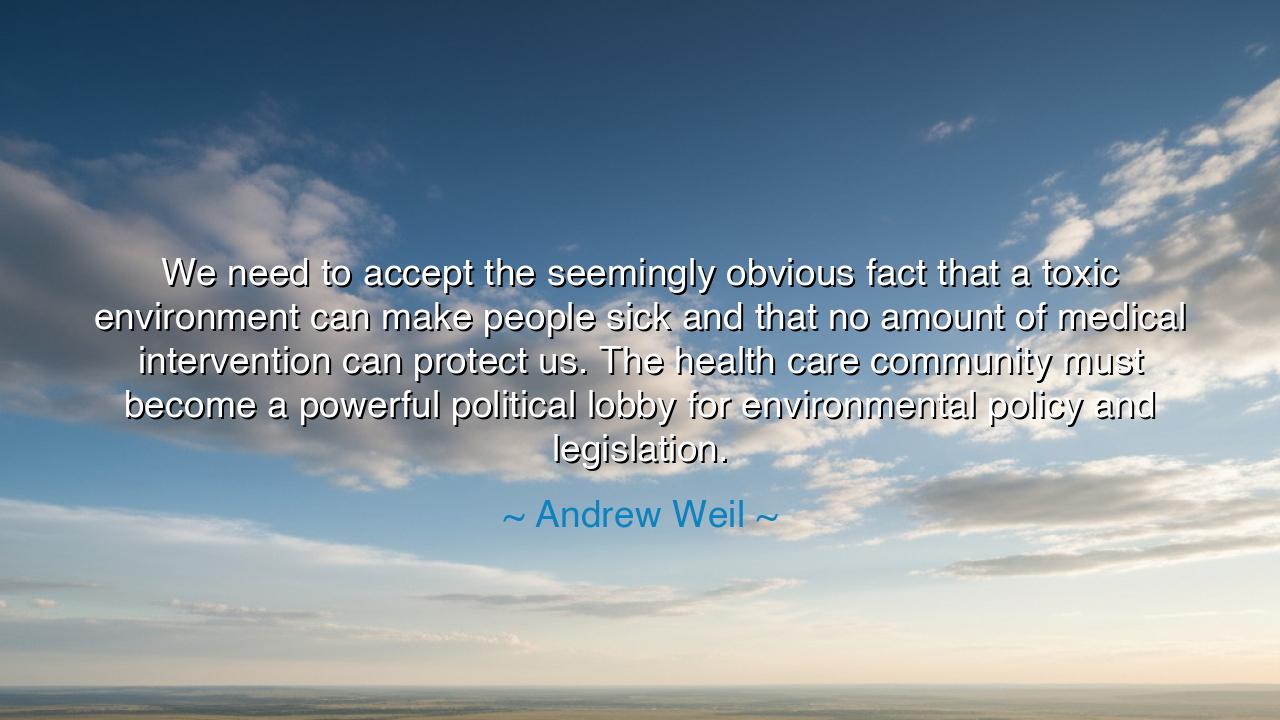
We need to accept the seemingly obvious fact that a toxic
We need to accept the seemingly obvious fact that a toxic environment can make people sick and that no amount of medical intervention can protect us. The health care community must become a powerful political lobby for environmental policy and legislation.






Hear this as a bell struck at dawn: “We need to accept the seemingly obvious fact that a toxic environment can make people sick and that no amount of medical intervention can protect us. The health care community must become a powerful political lobby for environmental policy and legislation.” In these words, Andrew Weil calls us back to first principles older than medicine itself. For before there were tablets and tonics, there was air to breathe and water to drink; before there were clinics, there were fields and fires, rivers and rain. When the well is poisoned, the cup is an afterthought. When the sky is a furnace of fumes, the stethoscope becomes a late and lonely instrument. The body is a house whose bricks are dust and sunlight; if the dust is tainted and the sunlight dimmed, the house cannot stand for long.
To accept this “seemingly obvious fact” is to remember what the healers of old knew: that prevention begins not at the bedside but at the watershed, not with the pill but with the policy. A physician can suture a wound; they cannot suture a river. A surgeon may excise a tumor; they cannot excise a smog-bank. Thus the line between public health and environmental policy is not a boundary but a seam—where care for bodies and care for places are stitched into a single garment. If the seam tears, our remedies slip through like sand.
Mark a lesson from history. In the winter of 1952, London’s Great Smog laid a yellow shroud over the city. Within days, thousands struggled for breath; within weeks, mortality spiked far beyond the ordinary toll. Hospitals overflowed, yet the wards could not outpace the air. No genius of medical intervention could protect those whose every inhalation was a dose. The cure, when it came, did not arrive through a new drug; it arrived through legislation—the Clean Air Acts that followed, the fuel shifts, the standards enforced. By changing the environment, the city changed the fate of its lungs. The chart of deaths bent only when the policy did.
This is the heart of Weil’s decree: when sickness springs from soil, smoke, and supply chains, the proper instruments of healing include statutes, standards, and civic courage. The health care community must not stand as a chorus of witnesses only; it must also be an engine of change—a political lobby that can speak with the credibility of clinics and the authority of evidence. For toxins do not respect the clinic’s door; they pass through it, invisible and relentless, carried by wind, water, and wages. To answer them, we need not only prescriptions, but legislation that guards the commons like a vigilant sentinel.
Some will protest: “Medicine should be neutral—above the fray.” But neutrality in the presence of harm is not virtue; it is abdication. When a flame advances toward the ward, the physician does not debate the color of the fire; they pull the alarm. So too with toxic environments—lead in pipes, particulates in neighborhoods, heat waves that turn cities into kilns. The oath to heal is not shrunk by stepping into the public square; it is fulfilled there, where root causes can finally be bound and tied.
Let the lesson be plain as bread: health is a system property. If the system is poisoned, the patient is imperiled. Therefore, bind clinical practice to civic practice. Gather data on asthma beside traffic maps; track kidney disease beside groundwater tests; read cancer registries alongside emissions permits. Turn findings into testimony, testimony into coalitions, coalitions into policy. This is not mission creep; this is medicine remembering its oldest boundary—the horizon.
And now, practical actions for those who would carry this standard: (1) Clinicians—screen for environmental exposures as you would for family history; document patterns and publish what you learn. (2) Hospitals—procure clean energy, reduce waste, and model the change you prescribe; let your supply chains be a quiet revolution. (3) Professional bodies—form dedicated advocacy arms; support bills that limit pollution, protect water, and cool the urban heat. (4) Researchers—translate findings into briefs a lawmaker can grasp in five minutes; bring patients’ voices to the hearing room. (5) Citizens—vote for clean air and safe water with ballots and with purchases; plant trees, protect wetlands, and join local boards where zoning and permits are decided. Do these things steadily, and the healing hand will lengthen—past the clinic, into the street, across the watershed—until environmental policy becomes the first and finest medicine, and the people breathe freely again.






AAdministratorAdministrator
Welcome, honored guests. Please leave a comment, we will respond soon